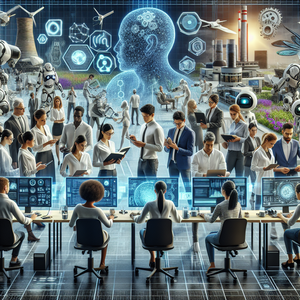
Bridging the Skills Gap: 20 Careers Driving Workforce Transformation
In today’s rapidly evolving economy, the "skills gap" has become a significant challenge, with a disconnect between the skills employers need and the expertise workers possess. Fueled by accelerating technological advancements, automation, and shifting market demands, this gap has far-reaching consequences. According to the World Economic Forum, nearly 50% of workers will require reskilling within the next decade, a statistic that emphasizes the need for urgent action. Beyond hindering individual career growth, the skills gap stifles innovation, reduces productivity, and directly impacts business performance. Industries like technology, healthcare, manufacturing, and education are facing acute challenges. For instance, while the growth of artificial intelligence (AI) has opened new doors, it has also created a pressing need for skilled AI professionals. Similarly, the cybersecurity sector struggles with a critical shortage of talent in protecting digital infrastructures. Proposed solutions to these issues range from reskilling initiatives to tighter collaboration between educational institutions and businesses, as well as a shift toward skills-based hiring practices. This article spotlights 20 essential roles across industries that are actively addressing the skills gap. These roles are not just jobs—they are pivotal in ensuring workforce readiness and organizational success. Whether you’re an employer looking to fill these roles or a professional pursuing opportunities in workforce development, this guide offers insights into the careers shaping the future of work.
Job Summaries:
Workforce Development Specialist:
- Workforce Development Specialists play a key role in identifying and addressing organizational skill shortages.
- They might design a training program to help a manufacturing company transition to using automated robotics.
- Proficiency in instructional design, communication, and learning management systems (LMS) is essential.
- Most professionals in this role hold a degree in education or human resources.
Learning and Development (L&D) Manager:
- L&D Managers oversee large-scale training strategies for organizations, ensuring employees are prepared to meet present and future demands.
- They might implement company-wide workshops on emerging digital tools like AI-powered productivity software.
- Strong project management skills and experience with eLearning platforms are crucial.
- A master’s degree in organizational development or education is often required.
Technical Skills Instructor:
- These professionals focus on teaching high-demand skills like coding, data analysis, or advanced manufacturing techniques.
- A Technical Skills Instructor might run a Python programming bootcamp for job seekers transitioning to IT careers.
- Industry certifications and teaching expertise are highly valued in this role.
Cybersecurity Educator:
- With cyber threats on the rise, Cybersecurity Educators are integral to workforce development.
- They design hands-on labs, certifications, and workshops to equip individuals with the knowledge needed to protect digital infrastructures.
- Certifications such as CISSP or CEH, paired with a solid IT or cybersecurity background, are typically required.
Soft Skills Trainer:
- Soft Skills Trainers specialize in developing interpersonal abilities like communication, leadership, and teamwork.
- They might conduct role-playing exercises to help employees improve conflict resolution in collaborative environments.
- Strong facilitation skills and experience in HR or corporate training are essential.
Career Pathway Advisor:
- Career Pathway Advisors guide individuals toward high-demand roles by assessing their skills.
- Recommending training opportunities.
- Offering personalized mentorship.
- They often work in schools, colleges, or workforce development organizations.
- Bridge the gap between education and employment.
Apprenticeship Program Manager:
- These managers oversee programs that combine classroom learning with hands-on experience, creating pipelines for addressing skill shortages.
- An Apprenticeship Program Manager might partner with a healthcare organization to train medical technicians.
- Expertise in networking and program management is essential.
AI Skills Trainer:
- AI Skills Trainers teach employees how to use AI tools effectively, helping companies integrate these technologies into their workflows.
- For example, they might train a sales team to leverage AI analytics for customer insights.
- A background in computer science and hands-on experience with AI platforms is critical.
Remote Work Productivity Specialist:
- As remote work becomes the norm, these specialists help employees optimize their productivity in virtual environments.
- They train teams on tools like project management software and video conferencing platforms.
- A strong understanding of remote work dynamics and digital collaboration tools is essential.
Digital Literacy Specialist:
- Digital Literacy Specialists ensure workers are equipped with foundational tech skills, such as using productivity software, navigating cloud systems, and staying secure online.
- They might design a course for older employees transitioning to a tech-heavy workplace.
- A degree in IT or education, paired with strong teaching abilities, is ideal.
Digital Transformation Consultant:
- These consultants guide companies through technological shifts, helping them adopt tools like automation software or cloud platforms.
- For instance, a Digital Transformation Consultant might help a retail company implement an e-commerce system, training employees in the process.
- Strong communication and technical expertise are key.
Skills Assessment Specialist:
- Skills Assessment Specialists use tools like competency tests and analytics software to identify workforce strengths and weaknesses.
- They might analyze data to determine if employees need training in advanced Excel functions.
- A background in HR, data analysis, or psychology is valuable.
Reskilling Program Coordinator:
- These coordinators design initiatives to help employees transition into new roles.
- For example, they might create a program for factory workers to learn programming as their company adopts AI-driven machinery.
- Strong organizational skills and expertise in adult learning principles are essential.
Talent Acquisition Specialist (Skills-Based Hiring):
- Talent Acquisition Specialists emphasize skills over traditional credentials like degrees, ensuring diverse and qualified candidates are considered.
- For instance, they might use AI-driven recruitment platforms to identify candidates with hands-on experience in software development.
Change Management Consultant:
- Change Management Consultants help organizations navigate transitions, such as adopting new technologies.
- They might work with a manufacturing company to train employees on using robotics in assembly lines.
- Strong leadership and project management skills are critical.
Diversity and Inclusion (D&I) Specialist:
- D&I Specialists ensure equitable hiring practices and work environments.
- For instance, they might develop mentorship programs for underrepresented groups in STEM fields.
- A deep understanding of diversity frameworks and experience in HR is required.
Upskilling Coordinator:
- These professionals focus on helping employees gain advanced skills, such as leadership training for mid-level managers.
- They monitor progress, measure outcomes, and adjust programs as needed.
- A background in HR or workforce planning is essential.
Corporate Training Consultant:
- Corporate Training Consultants create tailored solutions to address company-specific skill shortages.
- For example, they might design a workshop to teach employees how to use new CRM software.
- Strong consulting and instructional design skills are necessary.
Industry-Specific Technical Advisor:
- These advisors provide expertise in niche sectors like renewable energy, healthcare, or advanced manufacturing.
- For example, they might ensure a team of engineers understands the latest solar panel installation techniques.
- Deep industry knowledge is essential.
Skills Gap Analyst:
- Skills Gap Analysts use workforce data and surveys to identify critical skill shortages within organizations.
- They might analyze trends to recommend training in data science for a marketing team.
- A background in business, HR analytics, or data science is key.
The 20 roles highlighted in this article represent the forefront of efforts to bridge the skills gap across industries. From Workforce Development Specialists to AI Trainers and Skills Gap Analysts, these professionals are instrumental in shaping the modern workforce. For organizations, investing in these roles is a step toward innovation and sustained growth. For individuals, these careers offer an opportunity to make a tangible impact on one of today’s most pressing challenges. By embracing these roles and strategies, we can collectively prepare for a more adaptable and resilient future of work.
Explore More Jobs

